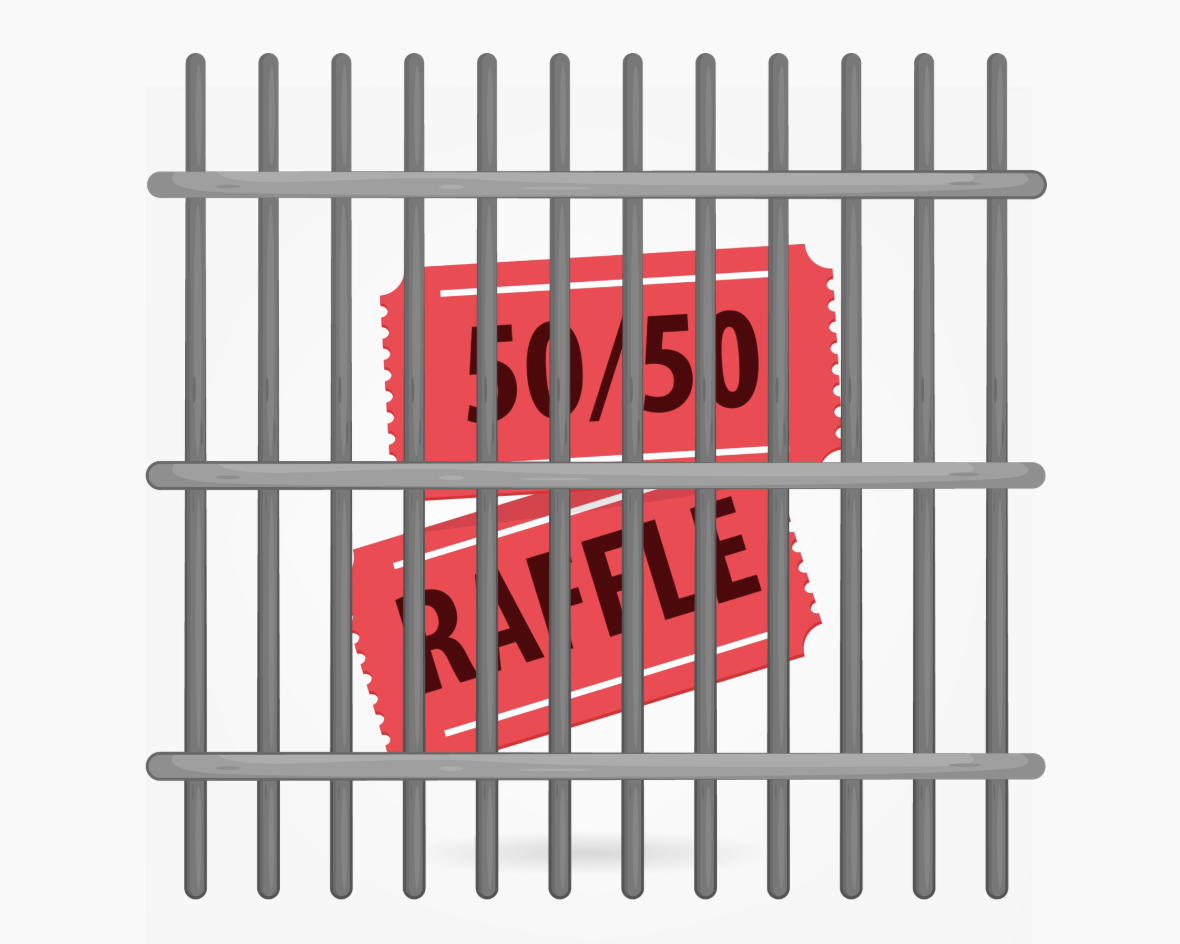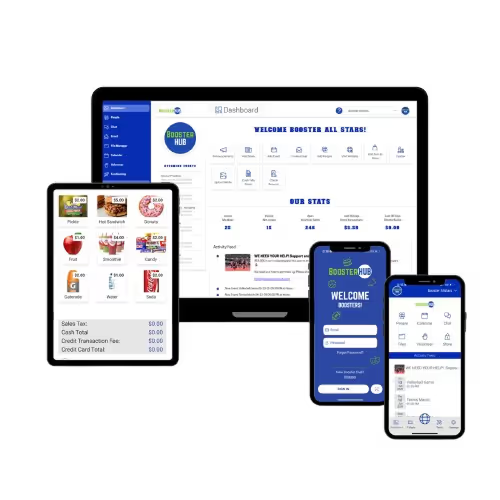
50/50 Raffles: Are They Legal?
If you've been involved in booster club fundraising for any length of time, you've probably heard about 50/50 raffles. They seem like the perfect fundraising solution: simple to organize, popular with participants, and capable of generating significant revenue with minimal upfront investment. But before your booster club jumps on the 50/50 bandwagon, there's a crucial legal consideration you need to understand.
What Makes 50/50 Raffles So Appealing?
The concept is beautifully simple. Participants buy tickets, and at the end of the event, one lucky winner receives half the total pot while your organization keeps the other half. The more tickets sold, the bigger the prize and the more money your booster club raises. It's a win-win that seems almost too good to be true.
And therein lies the problem.
The Legal Reality: It's Still Gambling
In most states across the country, 50/50 raffles fall squarely under gambling laws, regardless of their charitable purpose. Even when conducted by well-meaning booster clubs, these raffles involve the three key elements that define gambling: consideration (payment for tickets), chance (random drawing), and prize (the monetary reward).
Many states have specific exemptions for charitable organizations, but these exemptions often come with strict requirements including:
- Formal registration with state gaming authorities
- Obtaining proper licenses or permits
- Meeting specific organizational criteria
- Following detailed reporting requirements
- Limiting the frequency or dollar amounts of raffles
Some states prohibit 50/50 raffles entirely, even for charitable causes. Others require the organizing group to be a registered 501(c)(3) nonprofit.
The bottom line: Always consult with your state's gaming commission and legal counsel before organizing any raffle. The penalties for conducting illegal gambling can include fines, criminal charges, and serious legal consequences for your organization and its leaders.
Know Your State's Specific Laws
The most critical step for any booster club considering a 50/50 raffle is understanding your state's specific regulations. Laws vary dramatically from state to state, and what's legal in one state may be completely prohibited in another.
States That Prohibit Raffles Entirely
Some states simply don't allow raffles for fundraising purposes:
- Alabama: All raffles considered illegal lotteries with no exceptions for nonprofits
- Hawaii: Raffles prohibited unless participation is completely free with voluntary donations
- Utah: All raffles considered gambling and completely prohibited
States with Special 50/50 Restrictions
Even in states where raffles are generally legal, 50/50 raffles may face additional restrictions:
- Connecticut: Prohibits all cash prizes in raffles
- Massachusetts: Cash prizes may violate pooling prohibitions
- California: 50/50 raffles only allowed for major league sports affiliates
501(c)(3) Requirements
Most states that allow raffles require organizations to have formal nonprofit status. If your booster club is an informal group without 501(c)(3) designation, you may not be eligible to conduct raffles in many states.
Licensing and Registration Costs
Even where legal, raffles often require licenses or permits that can cost anywhere from $0 to $600 depending on your state:
- Free states: Arizona, Missouri, Montana, Ohio, Oklahoma, Texas, Vermont
- Low cost: Rhode Island ($5), Wisconsin ($5-$25), Delaware ($15)
- High cost: Tennessee ($150-$600), Virginia ($200), North Dakota ($175)
The Critical Question: Can You Sell Tickets Online?
One of the most important considerations for modern fundraising is whether you can sell raffle tickets online. This capability can dramatically expand your reach and make ticket sales much more convenient for supporters.
States That Allow Online Ticket Sales (29 states):
Alaska, Arizona, Colorado, Connecticut, Florida, Idaho, Iowa, Kansas, Louisiana, Maine, Missouri, Montana, Nebraska, Nevada, New York, North Dakota, Pennsylvania, Rhode Island, South Carolina, South Dakota, Virginia, Washington, West Virginia
States That Prohibit Online Sales (18 states):
Arkansas, Delaware, Georgia, Indiana, Kentucky, Maryland (varies by county), Massachusetts, Michigan, Minnesota, Mississippi, New Hampshire, New Jersey, New Mexico, North Carolina, Ohio, Oklahoma, Oregon, Tennessee, Vermont, Wisconsin
States with Conditional Online Sales:
- Hawaii: Yes, but participation must be free
- Illinois: Varies by local regulations
- Rhode Island: Only if platform is licensed by the state
- Texas: Unclear - check local regulations
- Wyoming: Unclear - no specific state guidance
Why Online Sales Matter
The ability to sell tickets online can make or break a modern fundraising campaign. Online sales allow you to:
- Reach supporters who can't attend events in person
- Process payments more efficiently
- Track sales and manage inventory automatically
- Expand beyond your immediate geographic area
- Integrate with social media marketing
However, online sales also bring additional compliance requirements in many states, including specific platform licensing, digital record-keeping, and sometimes additional fees.
Research Your State Before You Proceed
Before planning any 50/50 raffle, you must research your specific state's requirements. Here's what to investigate:
Key Questions to Answer:
- Are 50/50 raffles legal in your state?
- What type of organizational status is required?
- Do you need a license or permit, and what does it cost?
- Can you sell tickets online?
- Are there limits on prize amounts or frequency?
- What reporting requirements must you follow?
- Do local municipalities have additional restrictions?
Where to Find Information:
- Your state's gaming commission or attorney general's office
- Department of charitable organizations or consumer affairs
- Local legal counsel specializing in nonprofit law
- Other established nonprofit organizations in your area
Making the Right Choice for Your Organization
Understanding your state's specific laws isn't just about legal compliance – it's about making informed decisions that protect your organization's future. The legal landscape for raffles is complex and varies significantly by location, making research essential before you sell your first ticket.
Some booster clubs discover that the licensing requirements and restrictions in their state make traditional 50/50 raffles impractical. Others find that their state's laws are quite permissive, allowing them to proceed with confidence.
Either way, knowing the rules upfront prevents costly mistakes and ensures your fundraising efforts support your cause rather than create legal problems.
Remember, successful fundraising isn't just about choosing the most appealing option – it's about building sustainable, legal programs that protect your organization while effectively supporting your student athletes or activities.
Before implementing any fundraising strategy, take time to thoroughly research your state's specific laws, consult with experienced volunteers from other successful booster clubs, and when in doubt, seek professional guidance. Your organization's reputation and legal standing are worth far more than any single fundraising event.
Disclaimer: This article provides general information only and should not be considered legal advice. Laws change frequently, and local municipalities may have additional restrictions. Always consult with qualified legal counsel and your state's gaming commission before conducting any fundraising activities that might fall under gambling regulations.
Simplify Communications from App to Website


Take Control of Your Booster Club Spending with Debit Cards



.avif)